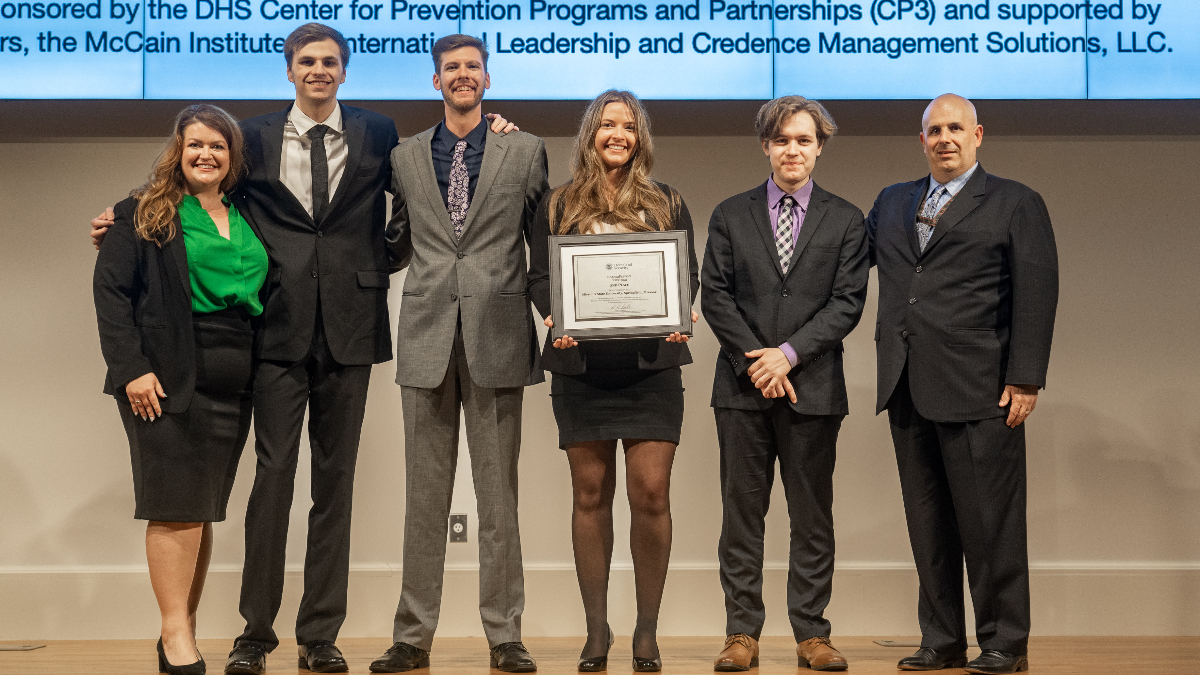Fostering a safe community for newly returned veterans was the key focus for Missouri State University Ad Team’s award-winning campaign.
The team’s digital initiative, Caliber Gaming Alliance focused on helping military veterans and young adults find a sense of community and purpose through gaming.
“The team used gaming to promote real-life connections and reduce feelings of isolation for Alliance members,” Ad Team instructor Samantha Francka said.
For the second year in a row, the team received second place and a $3,000 prize in the national Invent2Prevent (I2P) competition in Washington, D.C.
Through preventative student-led campaigns, I2P partnered with the Department of Homeland Security (DHS) to counter the threat of domestic terrorism and targeted violence.
Building a community free of hate
Times of transition for military veterans and those in their late teens and 20s can be incredibly isolating, senior Ad Team student Adrian Fruge explains.
Through research and discussions with local veteran services organizations, Ad Team found that times of transition can make our veterans more vulnerable to propaganda spread by extremist groups.
In response, the team partnered with veteran services groups in southwest Missouri and venue, Contender eSports, to foster a community that would give members a safe space to connect with one another.
Gaming is a great equalizer, Fruge notes. In addition, extremist groups often target both the gaming community and veterans.
“At our game nights, we like to choose games that encourage teamwork, and we use Discord to help members connect online as well,” Fruge said.
“Finding a sense of community is one of the best ways to inoculate a group against domestic violence.”
Sustaining momentum
The team saw high engagement from the alliance members and strong event turnout. This surprised their community partners who have struggled to sustain similar programs.
What set Ad Team apart? Fruge credits their use of fundamental marketing principles, strong branding and peer leadership.
Ad Team brought in peer mentors who received training from Ad Team on how best to speak about and counteract online hate speech and threats of extremism.
They created Caliber Gaming Alliance with longevity and cost constraints in mind.
Their success in the competition has led to opportunities for additional funding and expansion.
“The DHS will provide us with financial support for at least another term,” Fruge said. “We were also invited back to present on how well the sustainability piece of the project has worked out.
“Expanding local awareness and continuing to bring in community partners will be key to our continued success.”
There are Caliber Gaming Alliance events scheduled through the end of summer. Their partners have expressed interest in expanding the Alliance in southwest Missouri and other locations around the U.S.
Competing as a top-tier team
Ad Team is a for-credit, experiential learning course that has put marketing at Missouri State on the map. The team regularly lands on podiums at the national and international level and holds over 12 championship titles.
In October 2021, MSU received a $645,776 grant from DHS to expand efforts to prevent radicalization. The Targeted Violence and Terrorism Prevention (TVTP) grant will fund the Fuse project, which was created as part of an Ad Team competition in the 2020-2021 academic year.
Fuse encouraged university students to engage in meaningful conversations on difficult topics and form connections with peers.
This year, the team achieved success despite their small size of four student members. They were one of three teams selected to present in Washington, D.C., out of a pool of 30 top-tier advertising teams.
Fruge credits the course for helping him foster new friendships, networking connections and even a job. He is now on track to manage Contender eSports’ Springfield location upon graduating from Missouri State in December 2022.
“Getting involved with Ad Team is one of the most important things I’ve done in my life,” Fruge said.
“Our second-place finish was amazing, but it felt secondary to everything we learned and the opportunities we had to learn from industry thought leaders in Washington D.C.”

